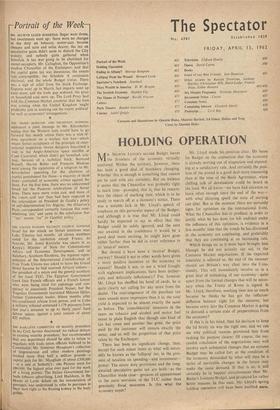—Portrait of the Week— MR. SELWYN LLOYD BUDGETED. Sugar went
down, but sweetmeats went up: there were no changes an the duty on tobacco; motor-cars became cheaper and suits and sofas dearer; the tax on speculative gains didn't seem to disturb the City unduly; and nobody quite gathered when Schedule A tax was going to be abolished for owner-occupiers. Mr. Callaghan, the Opposition's shadow Chancellor of the Exchequer, said that the capital gains tax was innocuous; the sweets tax contemptible; the Schedule A concession electoral; and the whole Budget trivial. There was a sigh of relief from the Stock Exchange. Exports went up in March, but imports went up evert more, and the trade gap widened; the price ot household coal went up. The Lord Privy Seal told the Common Market countries that the time was coming when the United Kingdom 'might profitably join in working out the future political' (as well as economic) 'arrangements.'
THE PRIME MINIS I ER AND PRLSIDLNT KENNEDY
addressed a joint message to Mr. Khrushchev saying that the Western tests would have to go forward this month unless there was a nick-of- time agreement on a nuclear test ban—which meant Soviet acceptance of the principle of inter- national inspection. Soviet delegates boycotted a visit to the Anglo-American space satellite at Cape Canaveral, which didn't get launched, any- way, because of a technical hitch. Bertrand Russell, Martin Buber and Francois Mauriac were among the signatories of a telegram to Mr. Khrushchev appealing for Ahe abolition of capital punishment for those—a majority of then?. Jews—convicted of economic crimes against the State. For the first time, there was no unleavened bread for the Passover celebrations of Soviet Jews. There were more votes cast, and more of the voters said 'yes' than had been expected in the referendum on President de Gaulle's policy ot self-determination for Algeria: the Observer's Paris correspondent correctly forecast this over- whelming 'yes,' and came to the conclusion that "yes" means "no" to Gaullist policy.'
. * 1.11E UNITED NATIONS SECURITY COUNCIL censured Israel for her attack on Syrian positions near Lake Tiberias last, month: all eleven members voted for the resolution except France. In Nairobi, Mr. Jomo Kenyatta was sworn in as Kenya's Minister of State for Constitutional Affairs and Economic Development, and in Salisbury, Southern Rhodesia, the regional repre- sentative of the International Confederation of Free Trade Unions was asked to leave the Grand Hotel because he had received African visitors— the president of a union and the general secretary of the local TUC. The Egyptian Government freed four French officials and a French lawyer Who were being tried for espionage and con- spiracy to assassinate President Nasser, but the Yugoslav Government rearrested Milovan Djilas, former Communist leader, fifteen months after his conditional release from prison, and in Cuba a military tribunal sentenced 1,179 prisoners from last year's invasion to up to thirty years' hard labour apiece, against a total ransom of about £22 million.
THE RADCLIFFE COMMITTEE on security procedure in thz Civil Service discovered 'no radical defects in existing security procedure,' but recommended that any department should be able to refuse to negotiate with trade union officials bel?eved to be Communist. Mr. Somerset Maugham's collection of Impressionist and other modern paintings fetched more than half a million pounds—a capital gain for Mr. Maugham of about £300,000 --at a sale at Sotheby's: one Picasso went for £80,000, the highest price ever paid for the work of a living painter. The Italian Government for- bade tobacco advertising. Lord Hailsham, in the House of Lords debate on the renunciation of Peerages, was understood to refer to peeresses in 'their own right as the floating kidney in the body Politic.


































 Previous page
Previous page